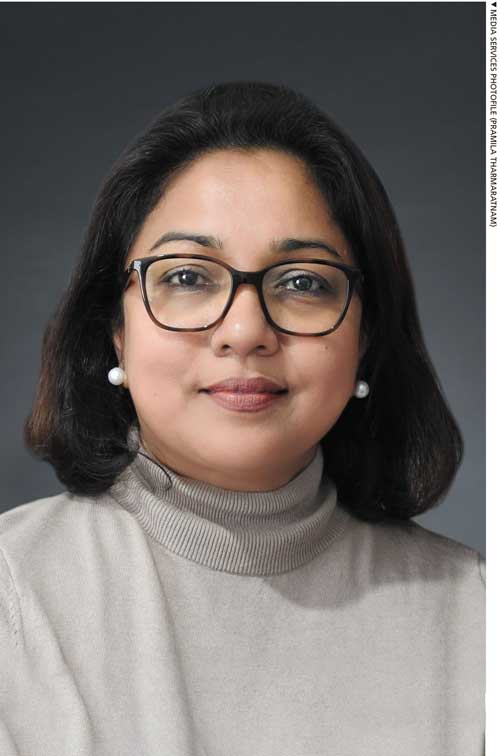Sharmila Tharmaratnam
Fighting the scourge of financial crime

Q: Australia’s financial landscape differs from that of Sri Lanka. How have you adapted your skills and knowledge, to comply with the regulatory and operational differences down under?
A: Australian banks and financial institutions are regulated by federal agencies, and constantly monitored – especially in the light of the recent failings by some of these institutions in recognising and reporting suspicious transactions.
Hefty fines were handed out and every financial institution has come on board to conduct due diligence on their customers.
All it takes is constant training and education to be aware. I also believe that you must be passionate to fight financial crime; and if you do, you’ll find ways and means to augment your knowledge.
The regulatory scene in Australia can be complex but it’s there for a reason; and once you understand how it works, it’s easy to implement. I made an effort to study the Anti-Money Laundering and Counter-Terrorism Financing Act, and understand how it works.
Additionally, I attend seminars and workshops frequently to keep pace with emerging trends.
Q: How do you stay informed about economic and geopolitical developments in Sri Lanka? And how does this knowledge influence your risk assessment and financial crime prevention strategies?
A: I read! I scour news websites, read LMD whenever I can lay my hands on it and talk to my friends in Colombo.
On a professional level, I keep abreast of the finance sector by reading newspapers – digitally, of course.
The typologies of financial crimes around the world change frequently and one has to be informed as to what can be expected. Most of the time unfortunately, organisations and governments can only be reactive as criminals are a few steps ahead.
While we’re playing catch up sometimes, we also work smart by predicting possibilities through risk assessments. Financial institutions are constantly mitigating risk based on their risk appetite and this helps in setting up various strategies to stop financial crime at the door.
The implementation of strong internal controls, conducting regular risk assessments, implementing anti-money laundering (AML) policies and fostering a culture of compliance are key aspects to financial crime prevention.
These measures may not be foolproof but will certainly reduce the impact of such crimes.
Q: Given your background, do you actively engage with professional networks or associations related to financial crime prevention either in Australia or Sri Lanka – or both?
A: Networking is the backbone of the financial crime world. I attend seminars, networking events and workshops to keep in touch with professionals from other institutions. We discuss trends and scams, and all the things that we see in our jobs.
For privacy reasons, we do not discuss cases but will talk about ways and means to combat the scourge of financial crime.
At this point in time, I’m only involved in Australia’s financial crime prevention programme, which has been implemented by the organisation I work for. But I’d love to interact with Sri Lankan professionals as well at some point.

Q: What memories did you take back with you, following your recent visit to Sri Lanka?
A: The people and their smiles! Sri Lankans never stop smiling and I love it! They look you in the eyes and smile, which is so comforting and full of warmth.
I’m proud that I am of Sri Lankan heritage; and I do the same as well – meaning, smile at everyone! I’ve had strange looks sometimes but carry on while many appreciate a friendly smile.
Another thing that amazes me about Sri Lanka is its never-say-die attitude. I saw it during the war, following the war and today, given the turmoil the country has had to face. This resilience is what makes people the way they are – and I love it!
I was so happy to catch up with friends, and share a meal and drink, and reminisce about the good times. When I’m in Sri Lanka, it’s like I never left. December is an awesome time to be in Sri Lanka – so much was going on and there were so many people everywhere.
Networking is the backbone of the financial crime world
FACT FILE
FAMILY
Sister
Brother-in-law
Aunts
Uncles
Cousins
Nieces and nephews
A wonderful bunch of great friends
SCHOOLING
St. Bridget’s Convent
Methodist College (for a short period)
HIGHER EDUCATION
Postgraduate diploma in business management
PRESENT OCCUPATION
Senior Analyst – Customer Due Diligence (at one of Australia’s ‘Big Four’ banks)
COUNTRY OF RESIDENCE
Australia
CITY OF RESIDENCE
Melbourne
CV IN A NUTSHELL
Sharmila Tharmaratnam hails from a family of four. While she describes her childhood as great, Tharmaratnam notes that it was challenging due to the civil conflict.
Over the years, her career has included stints in the aviation industry, and advertising and marketing communications, before a shift to retail banking. Tharmaratnam also worked at Sri Lanka Rūpavāhinī Corporation (SLRC) and Independent Television Network (ITN), as a news reader and presenter.
Following her move to Australia, she began work as a credit analyst and found herself in anti-fraud management, before joining the federal financial regulator as an intelligence analyst. Tharmaratnam’s next transition was to a bank in financial crime operations.
